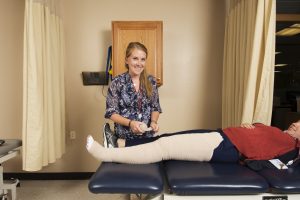World Lymphedema Day Q&A
March 6, 2021
Each year on March 6th, Helen Hayes Hospital marks World Lymphedema Day by working to raise awareness about lymphedema—the life-changing swelling condition that effects an estimated 250 million people worldwide. This year we sat down with HHH’s knowledgeable lymphedema specialists Erin Gonzalez, PT, DPT, CLT and Sheeja Slattery, PT, DPT, CLT for a Q&A on lymphedema symptoms and risks and the many benefits of complete decongestive therapy offered through the Hospital’s Lymphedema Treatment Program.
Q: What is lymphedema?
Lymphedema is swelling of a body part, (including but not limited to the arm, leg, head, neck, breast, genitals, and abdomen), which is caused by abnormal accumulation of protein-rich lymph fluid. The condition is both chronic and progressive. Most common complaints are feelings of heaviness, discomfort, limitations of function, and has a high risk of infection. The skin texture is also affected and may lead to thickening or hardening. While lymphedema often occurs without any obvious cause, it can be brought on by any injury or disruption of the lymphatic system. Some additional causes may include surgery, cancer (including radiation and chemotherapy treatments), obesity, infection, and venous insufficiency.
Q: Who is at risk for lymphedema?
The lymphatic system plays an important role in keeping your body healthy. It helps maintain fluid balance in the body by collecting excess fluid and toxins, filtering them into the blood stream, and excreting them from the body. It helps defend the body against infection by supplying lymphocytes. Anyone can develop lymphedema, some forms are genetic, known as primary lymphedema. Other forms are due to a “known cause”, otherwise known as secondary lymphedema. Often caused by cancer, cancer treatments, surgery, trauma, chronic venous insufficiency, and obesity.
Q: Is lymphedema dangerous?
If untreated, the risk of infection or cellulitis greatly increases. Cellulitis can lead to sepsis. Education, treatment, and long term care significantly reduces the rate of infection in those with lymphedema.
Q: What treatments are available for lymphedema at HHH?
Under the orders and clearance of a physician, following a thorough evaluation, lymphedema patients at Helen Hayes Hospital are treated by therapists trained and certified in complete decongestive therapy (CDT). CDT is considered the least invasive but most intensive treatment approach. Patients will generally be seen for one hour per day, two to five days per week, for two to six weeks. A long-term course of treatment will be decided and discussed following the consultation, as lymphedema is a chronic condition and must be managed for life. Treatment consists of patient education, skin care, manual lymphatic drainage (MLD), which is a specialized massage to help stimulate the lymphatic system, compression, and exercise.
Q: Is there anything a person can do to prevent lymphedema?
If you are at risk for lymphedema, discuss with your physician a referral to a certified lymphedema therapist or CLT. Education of initial signs and symptoms, as well as baseline measurements can help to recognize the onset of early lymphedema and provide treatment in order to reduce the risk of disease progression and infection.
Management of lymphedema can offer patients independence, self-confidence, and an improved quality of life. Please help us continue to spread awareness and hope for patients with lymphedema by sharing this Q&A. To learn more about the Lymphedema Treatment Program at HHH, please call x4194 or visit www.helenhayeshospital.org/lymphedema-program.
